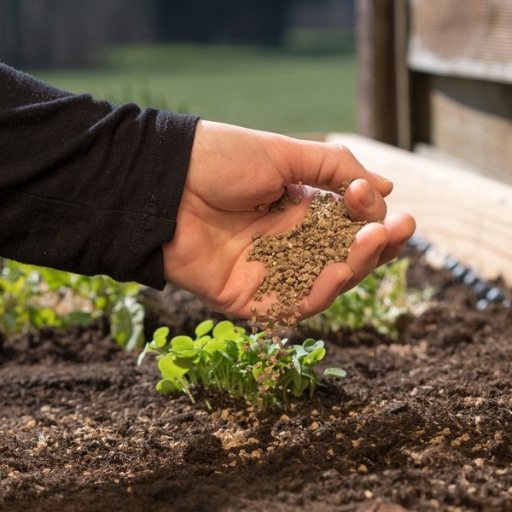When it comes to maintaining a healthy and thriving garden or lawn, choosing the right fertilizer is crucial. Organic granular fertilizers offer a sustainable and environmentally friendly option to enrich your soil and boost plant growth. This article will guide you through the benefits of using organic granular fertilizers, key factors to consider when selecting a product, and some of the best options available on the market. Whether you’re a seasoned gardener or just starting out, you’ll find valuable insights to help you create the lush, vibrant green space you desire. Let’s delve into the world of organic granular fertilizers and discover how they can transform your gardening experience.
What is Organic Granular Fertilizer?

Understanding Organic Fertilizer
Organic fertilizers are obtained from natural sources such as compost, manure and bone meal. Unlike synthetic ones which are made through chemical processes, they release their nutrients slowly hence encouraging soil health and fertility in the long run. A mix of necessary nutrients like nitrogen, phosphorous and potassium that enhance strong plant growth is included in them. Moreover, they improve soil structure, retain water more efficiently and encourage useful microbe activities making organic fertilizers the best choice for sustainable gardening.
The Benefits of Granular Over Liquid Fertilizer
Several advantages set granular fertilizers apart as better than liquid fertilizer choices to many gardeners. First, granules slowly release nutrients to plants over time ensuring a consistent supply throughout the season. This minimizes nutrient runoff into groundwater or surface waters and also avoids the need for frequent reapplication of such products. Second, granular formulations have longer shelf lives than liquid types because they can be stored easily unlike liquids. Finally, they are less prone to running off thereby reducing pollution of water bodies. These benefits make granular fertilizers an effective and convenient solution for maintaining healthy gardens and lawns.
How Organic Granules Work for Plant Nutrition
In one respect these organic granules decompose with time by breaking down naturally in soil releasing substances with which plants get fed through their roots at a rate that never exceeds what plants require thus avoiding over-fertilization risks. The main organic granules released include:
- Nitrogen (N): It assists in leafs’ development while also taking part in chlorophyll synthesis vital in photosynthesis; nitrogen can be sourced from well composted manures and dried blood.
- Phosphorus (P): For root formation plus flower/fruit production energy transfer within the plant needs this element; rock phosphate is one among several ordinary occurrences of bone meal.
- Potassium (K): One requires it for overall vigorous state; therefore it controls many physiological processes such as uptake of water and activation of enzymes. Kelp meal and wood ash are natural sources of potassium.
Technical Parameters:
- Nutrient Release Rate: Typically, organic granular fertilizers have a nutrient release rate ranging between 1-4% per month depending upon soil temperature and microbial activity.
- pH Level: Most organic granules are neutral in pH with a range from 6.0 to 7.0 which suits many plants.
- Nutrient Content: A balanced ratio is usually followed by the nutrient content in organic granules, for instance, 4-3-4 (N-P-K).
By continuously increasing the soil’s fertility using vital nutrients, they support eco-friendly plant growth while improving the quality of soil over time.
How to Choose the Best Organic Granular Fertilizer
A Close Look at the Nutrient Composition of Organic Fertilizer
When it comes to checking out nutrient composition of organic fertilizers, consider these factors as highlighted by top resources:
- Ratio of Nutrients: It should have a balanced nutrient ratio in relation to your plant requirements. Ratios like 4-3-4 or 5-5-5 (N-P-K) are common and therefore good for general garden plants.
- Source of Nutrients: Organic fertilizers should come from natural sources. Fish meal, blood meal, bone meal, kelp and compost are some of the ingredients that indicate high quality nutrients being present.
- Other Benefits: Some organic fertilizers come with beneficial microbes, mycorrhizae or other soil organisms that can improve soil structure and enhance nutrient uptake.
Observing this will help you identify an organic fertilizer that promotes healthy growth of plants which is sustainable.
Difference between All-Purpose and Specialized Fertilizers
Knowing the difference between an all-purpose and specialized fertilizer is paramount for proper plant management. As per the current best sources;
- All-purpose Fertilizers: These types of fertilizers are designed to cover many different plants such as flowers, vegetables, shrubs and trees. They generally have a balanced nutrient ratio like 10-10-10 or 5-5-5 (N-P-K) so that they provide a complete mix of essential nutrients for plants. In case you want to fertilize many kinds of plants in your home garden using just one product then all-purpose fertilizer is what you need.
- Specialized Fertilizers: On the contrary, specialized fertilizers are created specifically to meet specific nutrient demands for particular plant’s types. For example, tomato or rose food might be richer in certain nutrients like potassium or phosphorus necessary for particular growth needs. These often contain extra elements or micronutrients made to combat distinct deficiencies while promoting optimal health as well as productivity among crops.
Depending on the type of plant, choosing between general purpose and specialized fertilizers guarantees that your plants grow stronger and healthier.
Reading Labels: What to Look For
This is what you should be aware of while reading fertilizer labels in order to choose the best one for your plants. The current top websites highlight several crucial factors:
- N-P-K Ratio: Nitrogen (N), Phosphorous (P), and Potassium (K)three numbers indicated on the label, e.g., 10-10-10 stand for primary nutrient elements. This ratio shows a percentage of each nutrient. Nitrogen helps in growth of leaves, phosphorus supports root development and flowering processes while potassium enhances overall healthiness of a plant.
- Secondary Nutrients and Micronutrients: Some other elements like calcium, magnesium, sulfur, iron, manganese, zinc or copper must also be checked. They are essential for various physiological functions and can correct some deficiencies.
- Application Instructions: Check the recommended application rates and methods to avoid over-fertilization which may cause harm to plants as well as depletion of soil quality.
- Organic vs. Synthetic: These fertilizers can either be organic or synthetic according to their labels. Organic fertilizers improve soil structure as well as microbial activities while synthetic ones provide instant nutrients availability.
- Release Mechanism: There are slow-release fertilizers that will supply nutrients over an extended period while others are fast-release requiring more frequent application but providing immediate nourishment.
By paying attention to these details gardeners can make informed decisions about what they need for their plants under specific conditions of growth thereby ensuring a flourishing garden.
How to Apply Organic Granular Fertilizer

Application Techniques for Lawns
Putting organic granular fertilizer on a lawn involves many steps to ensure even spreading and optimum absorption.
- Proper timing: The best moments for applying a granular fertilizer are in early spring and late autumn. This is the time when grass grows rapidly thus it can utilize nutrients effectively.
- Preparation: A day or two prior to application, mow the lawn to medium height and water it lightly. Moisture on the lawn helps the soil and grass blades stick by the fertilizer granules.
- Calibration of spreader: For uniform application, use either broadcast or drop spreaders. Calibrate according to manufacturer’s instructions so that only appropriate amount of fertilizer is applied.
- Application: Fertilizer should be evenly distributed across the yard by walking at a steady pace. To avoid missing patches apply half in one direction (north-south) and then other half in another direction (east-west).
After applying fertilizer, lightly water your lawn. This will help dissolve granules leaving nutrients which penetrate into soil reaching roots.
Granular Fertilizer for Vegetable Gardens
Applying granular fertilizer in vegetable gardens can significantly enhance plant growth and yield. Here are the essential steps:
- Post Application: After applying fertilizer, water your lawn lightly. The granules will dissolve as they get wet allowing nutrient penetration into soil and reaching roots of grasses.
- Maintenance: Adjust watering routines while maintaining a healthy lawn through regular watering practices. Avoid over-fertilizing because this may cause nutrient runoffs damaging your grass as well as leading to environmental pollution through leaching processes.
- Soil test:Before you apply any fertilizers carry out a soil test first which will guide you on what type and amount you need for your garden
- Timing: Granular fertilizers can be applied at planting or during growing seasons; cool-season crops benefit most from early spring fertilization while warm-season crops require fertility treatments just before planting or at planting time
- Preparation: Ensure that you work 6-8 inches deep into soil by tilling it .Remove any debris such as dead vines so that there is a proper mixing of fertilizer with soil.
- Application: Measure the right amount of the granular fertilizers as indicated by soil test. Spread evenly across your garden bed or rows. Mix them into the topsoil to avoid direct contact with roots and burning them up.
- Watering: After applying a fertilizer, water your garden very well so that you can dissolve the granules and allow nutrients to reach root zone.
- Maintenance: Additional fertilization may be necessary at regular intervals during plant growth. Over-fertilizing should however be avoided since it may contribute to nutrient imbalances and cause plants stress.
By following these instructions, vegetable growers will maximize their plant development and ensure they have a good harvest at the end.
Seasonal Tips for Effective Application
- Early Preparation: This season is very important for cool-season crops as this ensures maximum absorption of nutrients due to optimal temperatures in soil.
- Balanced Fertilization: N-rich formulas are used for leafy vegetables where balanced granular fertilizer aids in growth during initial stages
- Frequent Monitoring: High temperatures result in quick depletion of nutrients thus necessitating constant checkup on symptoms of nutrient deficiency such as yellowing leaves for more application purposes
- Water Management: When using fertilizers, make sure that you combine it with proper watering schedule aimed at preventing runoff of nutrients while enhancing even distribution among them
- Get Ready for Winter: Give warm-season crops the final dressing of fertilizers to improve root development and hardiness during the chilling months ahead.
- Natural Choices: Think about organic granular fertilizers which decomposes gradually, giving plants consistent nutrition as they get set to go dormant.
Winter:
- Fertilize the Soil: Apply granular fertilizer during this time that will slowly break down into the soil thereby enriching it in readiness for the next planting season.
- Consider Mulching: This is important as mulching helps in keeping applied nutrients from being lost via leaching by winter rains.
By implementing these seasonal tips on how to apply manures, you will be able to achieve a more efficient and effective vegetable garden thus making it healthier and more productive.
Comparing Organic and Synthetic Fertilizers

Organic vs. Synthetic: Key Differences
Chemically manufactured synthetic fertilizers have nutrients that are readily available for plants. These provide immediate nutrient availability.
- Organic Fertilizers: Contain a relatively low concentration of nutrients but their essentiality cut across to a wider range of micronutrients and enable bettering of soil health through incorporation of organic matter.
- Synthetic Fertilizers: Contain high levels of specific nutrients necessary for specific crops; nevertheless, they lack the beneficial micronutrients and soil conditioning properties found in organic ones.
- Organic Fertilizers: This makes them environmentally friendly as they enhance the structure of soils by increasing microbial activity hence preventing the loss of nutrients from leaching and runoff.
While if not used properly, these can cause environmental issues such as water pollution due to nutrient leaching or even soil deterioration
- Organic Fertilizers: Most times it is more expensive compared to synthetic fertilizers with increased application rates required in order to obtain similar nutrition level. Moreover, it may be more difficult to apply it
However, Synthetic Fertilizer are cost effective if you have limited time and money because they contain more mineral salts than organics because they are less costly in terms of application costs per unit nutrient supplied
Knowing these characteristics will help one choose the right type of fertilizer depending on gardening goals particularly when one is considering environmental factors and requirements related to the condition of soil health.
Impact on Soil and Plant Health
Both types have significant impacts on soils and plants albeit different. Soil health is positively influenced by organic fertilisers obtained from natural sources over long periods. They improve soil structure by promoting porosity, water holding capacity (WHC) hence leading to desirable conditions for microorganisms that facilitate nutrient uptake by plants among other things. Furthermore this compatibility limits any possible cases where there might be contamination caused by chemical reactions between fertilizer components with other substances present in soil.
Nonetheless, synthetic fertilizers can cause long-term soil degradation despite being highly effective in providing prompt nutrition for plants. This is because their high concentrations of essential nutrients can affect pH and microbial balance in the soil leading to loss of soil nutrients later on. Also, excessive use of these chemicals may result in nutrient runoff into water sources which may lead to contamination of water bodies and subsequently destruction of aquatic life.
To choose appropriate fertilizer one must consider immediate plant demands as well as sustainable land fertility development. Combining both organic and synthetic fertilizers ensures better crop growth with maintenance of soil productivity.
Environmental Considerations
Organic versus synthetic fertilizers have different impacts on the environment. Being biodegradable, organic ones do not introduce synthetics into ecosystems: hence they are usually considered greener than their artificial counterparts. They reduce soil erosion by enhancing its structure and promoting microbial activity thus increasing bio-diversity. Nonetheless, there are disadvantages that include slow release rate and greater application volume required by some organic materials like manure or composts.
Though effective in increasing immediate plant growth and yield, synthetic fertilizers nonetheless have some major environmental drawbacks. They use a lot of energy during production and they have large quantities of green house gas emissions. Moreover, the wrong usage of synthetic fertilizers can result into an excess amount of nutrient runoff, thus causing water pollution which forms dead zones in aquatic ecosystems and harms wildlife. In addition, the constant use of artificial fertilizers makes soils acidic and deteriorating soil health over time.
For that reason, it is important to adopt good practices and use these fertilizers responsibly so as to promote sustainable agriculture for optimal plant growth as well as avoiding environmental risks.
Top Brands of Organic Granular Fertilizers

Most Recommended Brands
According to current highly rated sites, the following brands are the most recommended of organic granular fertilizers:
SHANDONG LOYAL CHEMICAL
SHANDONG LOYAL CHEMICAL is a well-known name in the field of organic gardening for its wide spectrum of organic fertilizers. LOYAL’S granular fertilizers enjoy great reputation as regard their nutritional balance and ease of utilization. The company takes pride in sustainability and exploitation of renewable resources as well as using environmentally friendly methods in their production processes.
Espoma
Espoma is a renowned name in organic gardening which offers wide range of organic fertilizers. Espoma’s granular fertilizers such as Bio-tone Starter Plus or Plant-tone for instance have good reputation due to they balanced nutrition and use with ease. The company believes in sustainability hence, it uses renewable resources and involves itself in environmentally friendly production processes.
Jobe’s Organics
Jobe’s Organics has many types of organic granulated manures that are suitable for various gardens requirements including products like All-Purpose Fertilizer and Vegetable & Tomato Fertilizer among others. Jobe’s exclusive blend Biozome that consists only beneficial microorganisms is added to enhance soil quality, fight disease, and increase nutrient strategy. Jobe’s Organics are known for their quick results and dedication towards organically based eco-friendly solutions for better gardens.
Factors to Consider When Choosing a Brand
I always consider some important factors when choosing an organiс granular fertilizer brand. First, I confirm that the product contains 100% natural materials by reading through its ingredients list just like those by Dr Earth . Secondly, we need to evaluate how much the brand values environmental friendliness in terms of its use of raw materials from renewables; this can be seen through SHANDONG LOYAL CHEMICAL who employs renewable resources . Thirdly I consider whether it should contain beneficial microorganisms to improve soil fertility and plant health or not, such as Jobe’s Organics’ variety of products containing their Biozome blend. Finally, I also look at my garden needs: if I need a multipurpose fertilizer or one specifically made for vegetables or tomatoes only. Choosing a product that will effectively underpin growth and wellbeing of my plants in a targeted manner depends on this factor
Frequently Asked Questions (FAQs)

Q: What is the best organic granular fertilizer for both garden and lawn?
A: The best organic granular fertilizer changes with specific needs but a recommended one is “Espoma Organic Lawn and Garden” that is certified as organic and provides balanced nutrition for lawns and gardens.
Q. How does organic plant food differ from chemical fertilizers?
A: Plant food that is organic in nature comes from natural sources and decomposes over a long period to provide nutrients whereas artificial fertilizers are made synthetically hence offer rapid nutrient release but could harm soil health as time goes on
Q. Is there an all-purpose organic plant food suitable for tomatoes and vegetables?
A: Yes, True Organic Tomato and Vegetable is a great all-purpose organic plant food that contains essential nutrients specifically for tomatoes and vegetables.
Q. Can I use liquid organic fertilizer for my potted plants?
A: Sure! Liquid organics are excellent for pot culture because they feed quickly. “Organic Plant Magic” is popular for this type of application.
Q. How does organic granular fertilizer improve soil health?
A: By slowly breaking down to release nutrients, it enhances soil structure while increasing the amount of humus in it thereby improving air circulation, water absorption ability, microbial activity etc.
Q. Can organic garden fertilizers be used for large scale organic agriculture?
A: Yes; however, use of these fertilizers can be extended to cover wider farming activities such as those crucial in an industrialized mode of production (agriculture). This means farmers can go for appropriate products like examples being Espoma Organic or True Organic depending on the kind of crops they intend to grow.






